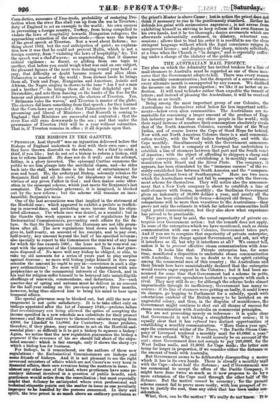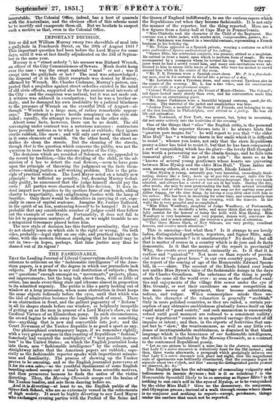TILE AUSTRALIAN MAIL PROJECT.
Tun plan on which the Admiralty has invited tenders for a line of mail-steamers to Australia must be regarded as one of those mea- sures that the Government adopts to kill. There was every reason for a monthly communication; but the despatch of a screw-steamer every alternate month is unsupported by any reason. We disliked the measure on its first promulgation ; we like it no better on re- flection. It will tend to hinder rather than expedite the transit of letters ; and instead of pleasing the Australians, it -will be received by them as an insult.
Being among the most important group of our Colonies, the
Australians see themselves rated below far less important settle- ments—below even alien communities. The Australians are re- markable for consuming a larger amount of the produce of Eng- lish industry per head than any other people in the world ; with their rapid increase of numbers their consumption absolutely rivals that of the North American Colonies, exceeds that of the West Indies, and of course leaves the Cape of Good Hope far behind. Now with our North American Colonies there is a mail communi- cation weekly, with the West Indies fortnightly, and with the Cape monthly. Simultaneously with the Government 'antiounce- ment, we learn that a company at Liverpool has undertaken to establish a line of steamers between that port and the South coast of America; with the object of affording to shippers a cheap and speedy conveyance, and of establishing a bi-monthly mail com- munication with Brazil and the River Plate. The company, it appears, has been stimulated by the "immense success" of the re- cently-established line between South America and the "compara- tively insignificant town of Southampton." Here are two cases which the Australians would not fail to compare with the Govern- ment scheme for themselves. They will notice also the announce- ment that a New York company is about to establish a line of mail-steamers with Genoa, monthly ; the Sardinian Government gives an indemnity of 50,000 dollars a year, and nearly all the capital has been subscribed in Genoa—decayed old Genoa. These comparisons will be more than vexatious to the Australians—they prove not only the estimate in which far inferior communities hold rapid postal communication, but they also show what experience has proved to be practicable.
They prove, it may be said, the usual superiority of private en-
terprise over Government action : but the remark does not apply. In some of the enterprises which we have mentioned, such as steam communication with our own Colonies Government takes part. And if you are to recognize that superiority of private enterprise, you only invert the charge against Government, and ask, not why it interferes so ill, but why it interferes at all ? We cannot tell, unless it be to prevent effective steam communication with Aus- tralia. It looks like that. Private enterprise has, for some time' manifested a disposition to undertake steam communication with Australia ; there can be no doubt as to the spirit existing among the commercial men of this country ; the Australians and their friends here have unmistakeably declared that the enterprise would receive eager support in the Colonies ; but it had been an- nounced for some time that Government had a scheme in pet-to; and of course private speculators hesitated to compete with such a rival. They may still do so; for although the scheme looks almost impracticable through its inefficiency, Government has many re- sources : if its line of steamers were getting on badly, it could lower its charges, go begging to Parliament for a subsidy, speak with ostentatious candour of the British money to be lavished on an ungrateful colony, and thus, in the disguise of munificence, the Government might continue to shut out all chance of success for steam communication with Australia on commercial principles. We are -not proceeding merely on inference : it is quite clear that Government is not taking a straightforward course- it is equally clear that it has refused two distinct opportunities of establishing a monthly communication. "More than a year ago," says the commercial writer of the Times, "the Pacific Steam Com- pany of Liverpool tendered a monthly snail for 48,000/. a year." But it was refused. Why ? It could scarcely be on account of the cost; since Government does not scruple to pay 240,000/. for the West Indian mails, and 31,0001. for Cape malls ; the latter sum being far larger in proportion, if we consider either the distance or the amount of trade with Australia.
But Government seems to be deliberately disregarding a means
which it has in its own hands. There is already a monthly mail with the Cape—about half the distance ; and if Government was too economical to accept the offers of the Pacific Company, it might have done twice as much as it now proposes to do by a mere extension of the Cape mail through the other half of file distance. But the motive cannot be economy; for the present scheme cannot fail to prove more costly, with less prospect of re- turn to justify the cost, than any other that has been under con- sideration.
What, then, can be the motive ? We really do tot know. It iS
inscrutable. The Colonial Office, indeed, has a host of quarrels with the Australians, and the obvious effect of this scheme must be 'to mortify and exasperate them all. But we hesitate to suspect such a motive as that, even in the Colonial Office.



























 Previous page
Previous page